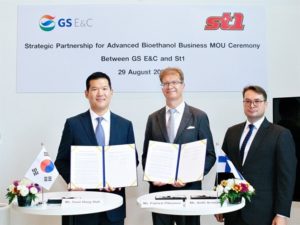
Korea’s GS E&C and Finland’s bioenergy company St1 to develop bioethanol using cassava waste in Thailand
GS Engineering & Construction (GS E&C) is joining hands with Finnish bioenergy company St1 to develop a next-generation bioethanol using cassava waste in Thailand. Cassava is a tuber root plant that resembles a sweet potato and it grows in tropical regions.
GS E&C President Huh Yoon-hong signed a memorandum of understanding for “cooperation in developing next-generation bioethanol technology” with Director of St1 Renewable Energy Patrick Pitkanen in Bangkok, where 10 officials from both companies attended the MOU ceremony, on Aug. 29.
“We expect the cooperation between the two companies will signal the next-generation bioethanol production business using unused waste. In the future, we will continue to put effort into becoming an iconic company of sustainable management in Korea by discovering opportunities for new eco-friendly and digital-based business,” Huh said.
The local construction firm says that if the project succeeds, it will be the first company in the world to produce bioethanol using cassava pulp.
Most cassava pulp, a by-product generated during processing of the crop, has been discarded until now, but GS E&C and St1 have decided to recycle it to produce bioethanol.
St1 is a new renewable energy subsidiary of St1 Oy, a leading energy firm in Finland, and it has the technology to produce bioethanol based on cassava pulp. Thailand is the third-largest producer of cassava in the world and the country is considered the optimal destination for the green business due to the abundance of cassava pulp there, which is normally discarded after the edible part is consumed.
“Previously, other raw materials like corn, sugar cane and wheat were used to produce bioethanol. But now this project’s method of producing a source of bioenergy using the waste of an edible crop is drawing much attention in the market and cassava pulp has emerged as an optimal alternative,” a GS E&C official said.
Source: http://m.koreatimes.co.kr/pages/article.asp?newsIdx=335358



